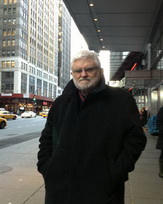
April 2, 2014
Chris McDonnell, UK
Collegiality,
the un-opened gift
of the Council
(Comments
welcome here)
chris@mcdonnell83.freeserve.co.uk

|
|
April 2, 2014 Chris McDonnell, UK
Collegiality,
|
chris@mcdonnell83.freeserve.co.uk
|
Many
documents came from weeks and months of deliberation during the time of the
Second Council of the
This
November sees the 50th anniversary of the promulgation of Lumen
Gentium. Maybe we should be asking a few questions, not only of
How
have we got into this cul-de-sac, where the Council showed us a way forward but
we seem to have hardly begun the journey? Kevin Kelly in his book “50 years of
receiving Vatican II” says that “Vatican
II was not an event but a continuing process”.
How
have our Bishops allowed the continuance of the Petrine Primacy model to remain
substantially unchanged over the fifty years since the Council closed?
Why
haven’t we been more vocal in our protest at continual attempts in Rome and
elsewhere to maintain the status quo in spite of the Council, where 2,151
bishops signified their assent to Lumen Gentium and a mere 5 expressed
opposition to it?
This
whole matter has in recent years come to prominence with the manner in which the
New Translation of the Roman Missal has been foisted on the English speaking
church. Donald Cozzens writes in his recent book ‘Notes from the
Underground’ “It is the worst spiritual stumbling,
save the virtual rescinding of the Second Vatican Council I’ve encountered in
almost fifty years as a presider”
The
need for real collegiality is self-evident. The Bishops did as they were told
and we got what
Now
with Francis, there is hope of movement. This pope, who refers to himself as the
Bishop of Rome, has set in motion strands of development that may well be
fruitful. The gathering of the C8 Cardinals is a positive and hopeful sign. The
forthcoming special synod on the family, in October 2014, followed by the
general synod in 2015, takes us into new waters where the laity have actually
been asked for an opinion. We must now be ever vigilant that our voice is heard,
that we are listened to.
Change
can come from two directions, from above and below. Francis needs the support of
the whole Church to achieve this change. It is up to all of us, finally, to open
the unopened gift of the Council.
May
I recommend that you follow this
link to the recent Von Hugel Institute lecture in the